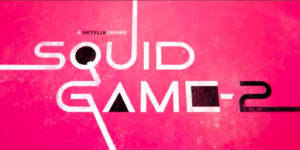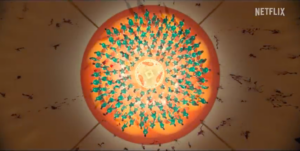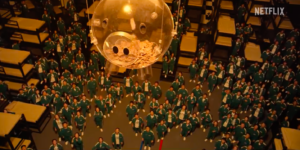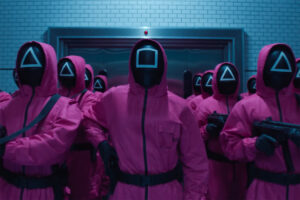Editor’s note: This review contains brief discussions of transphobia and suicide. If you or anyone you know is experiencing distress, a list of helpline numbers from around the world can be found here.

Ah, Squid Game 2. 2 Squid, 2 Game. Squid Game 2: Electric Boogaloo. Squid Game 2: This Time it’s Personal Debt. I won’t go on (though I do have more of these). Everyone’s favourite elimination death competition decided by children’s games, 2021’s Squid Game, was not just a hit; it was a phenomenon. Breaking Netflix records, the show reached the number one position in 94 countries, and became the most watched show on the platform. The iconography of bold primary colours, video game controller symbols, pink guard uniforms, green tracksuits and unnerving robotic giants spread all over the world. After this huge success, a second series was swiftly confirmed. After its release on 26 December, it has already hit the number one spot, simultaneously, in 93 countries.
So, for creator Hwang Dong-hyuk, the pressure was on. Could he and his team deliver a second story satisfying enough to keep the world hooked? Would it work? The answer is that yes, they could and it does, if without the explosive impact of the first series. Whilst Squid Game 2 inevitably suffers from a slight case of Hunger Games: Mockingjay-itus (we all want the characters back in the death game, but why on Earth would they go back?), it manages to provide enough new motivations, characters and moral conundrums to remain a deeply entertaining watch.
The opening of Squid Game 2 drops us back in at the exact moment we left off, with a red-haired Seong Gi-hun (Lee Jung-jae) turning on his heels at the airport, searching for the evidence of those spying on him as he vows revenge to the Front Man (Lee Byung-hun) on the phone. It’s a smart decision by Hwang to drop us back in at this point, reassuring the audience that there won’t be any straying from the central storyline or character that gripped us in the first series. However, this is undermined slightly by the show’s first two episodes, which seem to betray a nervous need to justify and explain the continuation of Gi-hun’s narrative and its practicalities.
Within these first two episodes—“Bread and Lottery” and “Halloween Party”—we learn the extent of Gi-hun’s dedication to finding out who is behind the games. We also follow the intrepid policeman Hwang Jun-ho (Wi Ha-jun), equally determined to locate the island where his missing brother, the Front Man, is leading the organisation of the games. These episodes provide a welcome extension of the Squid Game universe; for example, we get to see the full extent of the Recruiter’s dedication and sadism, portrayed with a twinkling glee by Gong Yoo.

It certainly makes narrative sense to broaden the story out like this, though it does feel rather inert by the second episode, as though we’re watching an unskippable explainer video about a game we’re itching to start playing. These introductory episodes are necessary and often compelling (Russian Roulette always will be), but they do slightly dampen the pacing in a way that never troubled the first series.
By episode three, “001”, Hwang Dong-hyuk knows that the audience is getting impatient, and throws us straight back in to the world of the games. It’s from this moment that the show begins to barrel along again, with the confined quarters of the dormitory, hallways and playing fields pushing the action back to its colourful, frenetic self. If you didn’t want to lose any of the iconic elements of the first series, there is no need to worry: they know better than to play with any of that. The outfits are the same, the layout is surreal and Escher-esque, the lighting, the sets and the cinematography have not budged from the high saturation, wide overhead shots and painful close-ups of dread-filled faces. It’s quite impressive how confidently the creative team have stuck to this mise-en-scène, with no need to add any new element or approach. It’s a testament to their confidence in the storyline and the characters to carry the drama forward.

And it is the characters of Squid Game 2 that are the biggest ingredient in its success. Whilst the question of how to realistically get Gi-hun back into the games is answered a little too painstakingly, the similar question of how to introduce new characters who feel different enough to those of series one is more confidently answered. Whilst similar tropes can be found—a mole who actually works for the games, a villainously psychotic contestant bullying everyone else, brooding young women who have real-life concerns propelling them through—there is a refreshing number of new character types too, with even the tropes getting a fresh approach.
Whilst there has been some criticism of Choi Seung-hyun’s performance as the obnoxiously nasty Thanos, his posturing and mockery of the whole system separates him from series one’s thuggish Deok-su (Heo Sung-tae). His is a character built to be hated, and it is also a brilliantly meta touch to have him playing the character of a failed rapper with a substance abuse problem. This storyline nods pretty openly to the real-life issues faced by Choi, better known as Big Bang’s T.O.P, and is not the only character choice with its eyes to the real world.
Though the subject of much controversy in the casting of a cisgendered man to play the role, the character of Hyun-ju (Park Sung-hun) is also a revelation which contains a critique of South Korea’s treatment of the LGBTQ+ community. A general in the Korean army before her transition, her skills in combat and marksmanship become a key factor in the series’ final episode, whilst her relationship with the timid Young-mi (Kim Si-eun) and the fiery mother figure Geum-ja (Kang Ae-shim) forms the emotional heart of the series.

Her former role in the army could be read as a nod to the story of Byun Hui-su, a transgender soldier who was discharged from the army after transitioning and sadly died by suicide. These allusions from these characters to the real world extend the more general references of series one to events and situations in South Korea, emphasising to the audience that the world we’re watching is not far away from our own at all.
By giving Hyun-ju depth and personality (in no small part the work of actor Park), the show is able to display the humanity of this community that is so woefully treated and under-represented in South Korea. Some of the most emotional moments in the show come from Hyun-ju, along with the funniest (her put down of the unhinged shaman Seon-nyo, played by Chae Kook-hee, is one of the best threats you’ll hear in a long time). Geum-ja, the tired but fiercely maternal figure who joined the games to help her son Yong-sik (Yang Dong-geun) also adds a warmth as well as a humour that was largely missing from the first series.

These two characters are welcome female additions to the series, along with Kim Jun-hee (Jo Yu-ri) as a young pregnant woman, Won Ji-an as the cool and independent Se-mi, and Park Gyu-young as Kang No-eul, a North Korean defector who gives us insight into the world of the guards when she becomes one. These characters are just some examples of the new perspectives brought in for the second series, which have been intelligently drawn and acted to create a new dynamic from that of the previous one.
This dynamic in Squid Game 2 is also different in its use of humour for its set pieces. This comes not only in the smaller moments between characters like Geum-ja and Yong-sik, but also in the games themselves. From the very first kill shot in the Red Light, Green Light game, through to the set of five mini-games played around a rainbow race course whilst players are chained together by their feet, there is a lightness in the earlier game sequences that did not exist before. Particularly in the five games sequence, the players’ chants of “1,2!” as they stroll forward, combined with the montage of failures and successes across the games, seem deliberately comic. The music in this sequence is the most fun the show has ever used, and even the guards’ hand gestures seem almost cute.

This use of comedy is new for this universe, and it is a clever way to both distinguish this series from its predecessor, heightening the impact of the horror when it does arrive. The contrast between this mini-game challenge and the one that follows, ‘Mingles’ is much greater in tone, making the latter as menacing as the Glass Bridge of series one. It is also a clever touch to have begun the competition with the same, and most iconic, game as the first series, but to continue it with different ones, allowing even further new elements to influence our new characters.
Squid Game 2 also doubles down on its critique of exploitative capitalism and its centrality to modern life. Whilst there were divisions aplenty in the first series, in the second one, the players are divided by how strong their desire for the cash prize is, versus their desire to stay alive and work to improve themselves. This division is portrayed in multiple votes as to whether or not to continue the process, with the ‘pro’ side sporting blue ‘O’s on their uniforms and the ‘anti’ side red ‘X’s. These multiple votes punctuate the narrative and provide a useful motivation for the sympathetic characters, whilst also hammering home the toxic power of the promise of wealth and a quick fix. Not a show short on disturbing imagery, one of the most unsettling scenes of series two is when half of the contestants begin chanting for ‘one more game’, in a fiendishly simplistic representation of what exploitative gambling does to the people hooked in by it.

This is not a subtle portrayal, but the Squid Game universe is not trying to be. From the block colours, the fantastical set, to the use of games specifically for children, it is clear that the messages the show wants to convey are similarly simple and overt. Some critiques of the show have called this messaging over-simplified, but themes do not need to be subtle and complex when their worldly equivalents aren’t either. Squid Game 2manages to extend the anti-capitalist messaging of series one without upending its narrative, introducing new moods and characters to only extend its ideas.
Whilst the pacing of the show does suffer in the first two episodes, with an ending that is similarly flawed in its structure (we very much end in the middle, and have to wait until 2025 for any kind of conclusion), the rest holds strong. There are storylines to follow, characters to care for, and a genuine question as to how it will develop. Squid Game 2 cannot be the revelation that series one was, but it is brave, bold and complex enough to be a worthy successor.
(The Guardian [1], [2] Pink News, YouTube. Images via Netflix.)

0 Comments